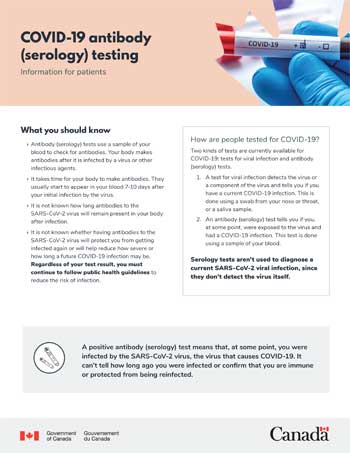COVID-19 antibody (serology) testing: Information for patients
Find information on the requirements for getting medical devices authorized in Canada on the medical devices page.
On this page
- What you should know
- How are people tested for COVID-19
- What does it mean if you have a positive test result
- What does it mean if you have a negative test result
- Follow public health advice to slow the spread of COVID-19
What you should know
- Antibody (serology) tests use a sample of your blood to check for antibodies. Your body makes antibodies after it's infected by a virus or other infectious agents, or after you receive a vaccination.
- It takes time for your body to make antibodies. They usually start to appear in your blood 7 to 10 days after your initial infection or after your vaccination.
- Vaccination is one of the most effective ways to prevent the spread and reduce the impact of an infectious disease.
- The antibodies that may be produced after infection with SARS-CoV-2 will not necessarily protect you from getting sick again and it's not known how long they will remain in your body.
Regardless of your test result, you must continue to follow public health guidelines to reduce the risk of infection and transmission.
How are people tested for COVID-19
Two kinds of tests are currently available for COVID-19: tests for viral infection and antibody (serology) tests.
- A test for viral infection detects the virus or a component of the virus and tells you if you have a current COVID-19 infection. This is done using a swab from your nose or throat, or a saliva sample.
- An antibody (serology) test tells if you have antibodies to the SARS-CoV-2 virus. These antibodies may have developed in response to a previous infection by the SARS-CoV-2 virus or in response to vaccination. This test is done using a sample of your blood.
Serology tests aren't used to diagnose a current SARS-CoV-2 viral infection, since they don't detect the virus itself.
A positive antibody (serology) test means that you have antibodies to the virus that causes COVID-19. The test cannot tell how long ago you may have been infected or determine if you're protected from reinfection as a result of previous infection.
What does it mean if you have a positive test result
If you have a positive serology test result, it's likely that you previously had a COVID-19 infection and that you developed an antibody response to the virus. It may also indicate that you developed antibodies in response to vaccination.
A positive result does not necessarily mean that you're protected from infection.
There's also a chance that this test can give a positive result that is wrong (a false positive result). Even a very precise antibody test may produce false positive results on occasion.
If you have questions about the results of your antibody test, it's important to talk to your health care provider to help you understand.
What does it mean if you have a negative test result
If you have a negative serology test result, it likely means that antibodies to the virus that causes COVID-19 were not present in your sample.
There is also a chance that this test can give a negative result that is wrong (a false negative result). Even a very precise antibody test may produce false negative results on occasion. A false negative result could occur if you were tested too early after a COVID-19 infection or vaccination.
If you have questions about the results of your antibody test, it's important to talk to your health care provider to help you understand.
Follow public health advice to slow the spread of COVID-19
Even if you have previously had a COVID-19 infection or vaccination, you must still follow public health advice. You must take the same actions to prevent COVID-19 as someone who has never had the infection or the vaccine:
- Wash your hands often with soap and water for at least 20 seconds.
- If soap and water aren't available, use a hand sanitizer containing at least 60% alcohol.
- Stay home as much as possible and if you need to leave the house, practise physical distancing (about 2 metres).
- Wear a non-medical mask or face covering to protect others when you can't maintain a 2-metre distance.
- Avoid close contact with people who are sick.
- Cough and sneeze into your sleeve and not your hands.
- Follow the advice of your local public health authority.
Please contact your health care provider with any questions or concerns about your test.
For more information on COVID-19: 1-833-784-4397 Canada.ca/coronavirus
